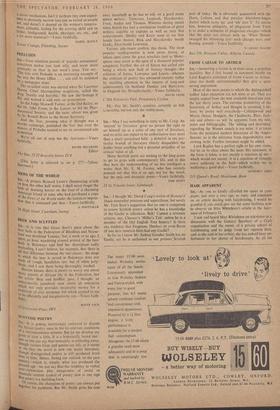S MITISH POETRY is getting increasingly awkward to discuss the fiction/poetry
issue in the tip-and-run conditions of a correspondence column. But let me develop my Point at least a little. It is a historically broad one : just as one can say that monarchy is withering away, though various kings and queens are left, So it seems !,_° me that the novel is now our major literature, ,Tmtgh distinguished poetry is still produced from cemoe to time. Hence, basing our outlook on the past ntur Y—which is, simply, what has produced the Present age—we can say that the tendency to verbal elaboration plus meagreness of social or uramatic content typical of poetry now is one sign that poetry is a declining form. Of course, the champion of poetry can always put together his pantheon. But Mr. Smith gives his MSC
away inasmuch as he has to rely on a good many minor writers : Tennyson, Leopardi, Mayakovsky, Frost, Auden and Thomas. Whereas during recent times fiction has had a continuous tradition of great writers, capable of copious as well as very fine achievements. Shelley and Keats seem to me thin beside Jane Austen, Blok and Mayakovsky beside Gorky, Eliot beside Lawrence.
Various side-issues confirm this thesis. The most popular reading-matter is now prose fiction, at whose apex come the great novelists (just as Shake- speare once stood at the apex of a thousand popular songsters). Further, the art of fiction has called into being a whole new field of literary thought—the criticism of James, Lawrence and Leavis—whereas the criticism of poetry has advanced recently rather by recalling attention to the lessons of long-past achievements (in Scotland Dunbar and Henryson; in England the Mctaphysicals).—Yours faithfully,
DAVID CRAIG C 264, University Park, Peradeniya, Ceylon
PS.—For Mr. Smith's comfort, certainly an itch is invisible, but.not only the visible mars.


































 Previous page
Previous page